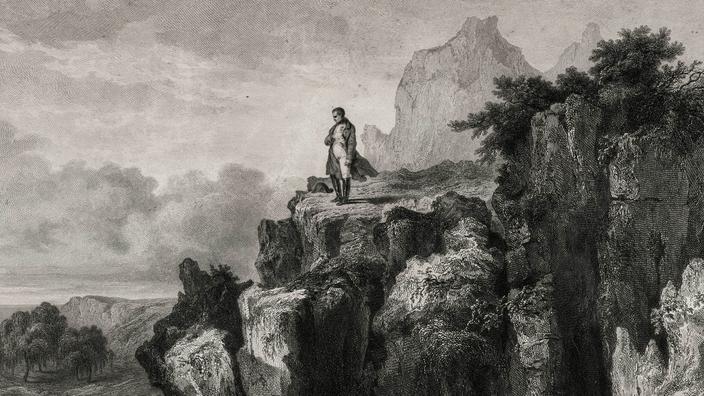Played by Fouché who made him believe, after his abdication, that he could find refuge in the United States (he would have already obtained from the English, according to him, safe-conducts), Napoleon discovers in arriving at Rochefort on July 3, 1815, that he fell into a trap.
After several hesitations, he decides to seek asylum in England and embarks on the Bellerophon, declaring to Captain Maitland: “
I place myself under the protection of your prince and your laws.
"
To read also: Michel De Jaeghere: "Napoleon, bring in the accused"
But the English government refuses to welcome him to its soil.
Napoleon was outlawed by the Congress of Vienna.
London decides to deport him to Saint Helena, an isolated island in the Atlantic, accessible only through the port of Jamestown.
Transferred to Northumberland on August 7, he was accompanied by General Bertrand, Grand Marshal of the Palace, and his wife, General de Montholon, aide-de-camp, also accompanied by his wife, General Gourgaud, orderly officer, and the Count of Las Cases and his son, as well as several servants including the valet de chambre Marchand and the Mamluk Ali.
When he landed in Saint Helena on October 16, he quickly understood that any escape would be impossible. He chooses another strategy: to show the world the unworthy conditions in which he is being held. From the outset he therefore denounces a finicky and humiliating surveillance. The Longwood residence is poor and unsanitary.
Napoleon will find in Hudson Lowe an unwitting ally. The new governor arrives in the island on April 14, 1816. He is a vain, petty and rigid man who drags behind him the memory of the inglorious evacuation of Capri from the French in 1808, which Napoleon never misses. not to remind him on occasion. The first meeting takes place on April 17. Napoleon very quickly judges man: he will be easy to handle. Relations quickly grew strained without Napoleon trying to coax the governor. This one multiplies the bullying and Napoleon can then exclaim that martyrdom "
strips him of [his] tyrant skin
".
The framework and the roles distributed, it remains to take Europe as a witness. For this, Napoleon has his entourage and in particular Las Cases. The Fallen Emperor knows that he is taking notes for a future book. Gourgaud and Bertrand imitate him. Napoleon dictates his Memoirs and multiplies the confidences. The splendor of the Napoleonic epic revived from then on through his words scrupulously recorded by his followers. The same also relate to the bullying suffered by the Emperor, who is refused title and honors.
It remains for Napoleon to pose as a martyr of the Holy Alliance formed by his conquerors and a champion of the liberal and national ideas that the sovereigns of Europe try in vain to crush.
“
Nothing can henceforth destroy or erase the great principles of our Revolution, proclaims Napoleon, (…) and this memorable era will be linked, whatever one may wish to say, to me; because after all, I shone the torch, consecrated the principles, and today the persecution is making me the messiah.
"
The publication in 1823 by Las Cases of the Memorial of Saint Helena caused a sensation.
Napoleon had died on May 5, 1821 in indifference.
The Memorial reveals the image of Prometheus chained on his rock, recalls the past glory in perfect contrast with the mediocrity attributed to the Bourbons.
He made Napoleon the glorious heir to the Revolution.
The romantics, from Dumas to Hugo, ignite, the liberals rise up, the half-pay are enthusiastic.
The legend was born.
It will cross the centuries.
It is, for Napoleon, the last victory.
Cover of the Figaro Hors-Série Napoleon: the epic, the myth, the Versailles trial, RMN-Grand Palais, Franck Raux
Discover on Figaro Store,
Le Figaro Hors-Série Napoleon: the epic, the myth, the trial
“
A single man was alive then in Europe; the rest of the beings tried to fill their lungs with the air they had breathed
". Fifteen years after Napoleon's death, Alfred de Musset thus expressed the grandeur of the myth he had embodied. That of a strategic genius carried by an irresistible enthusiasm, a flamboyant epic, whose brilliance and panache remain. To commemorate the bicentenary of his death, on May 5, 1821, the Figaro Hors-Série is associated with the two major exhibitions organized at the Army Museum (the Death of the Emperor) and at the Grande Halle de la Villette (Napoleon ), and retraces, with the help of Napoleon's best specialists, the incredible itinerary of the melancholy young Corsican who became emperor of all the French. Story of his life in twelve days, illustrated dictionary of characters (wives, family, generals, ministers), decryption of the myth sifted through history: savior of the Revolution,civil and military engineers, conqueror of Europe… Discover the incomparable destiny of Napoleon.

